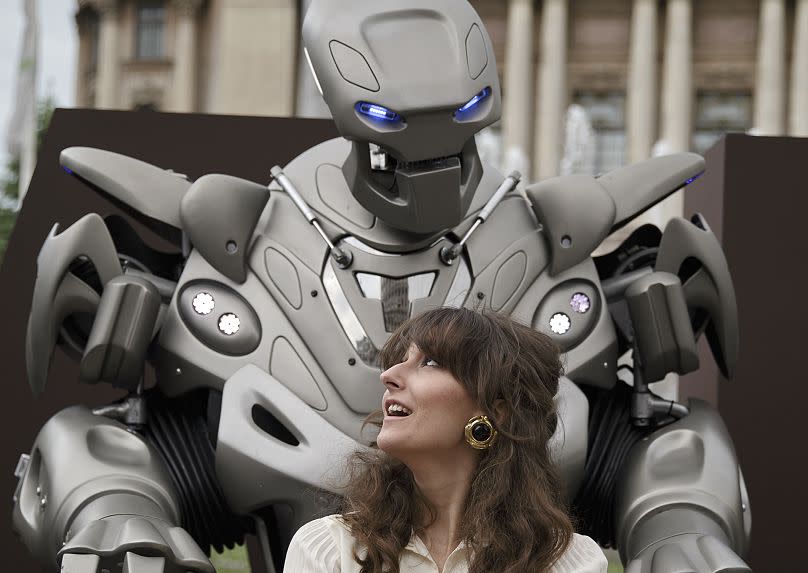Are androids our friends or our enemies? It depends on the context.
Most G7 countries have mixed feelings about robots, according to a United Robotics survey of nearly 8,000 people in the US, France, Canada, Italy and Germany, and obtained exclusively by Euronews Next.
Although the majority sees further developments as “inevitable,” many people worry that robots may become too aggressive in the future.
People mostly reject the idea of human-looking androids
The big fear across all the countries surveyed is being replaced by a robot in some way.
Almost 80 percent are concerned that they could take jobs away from people, and 71 percent believe that robots could take the role of humans in social interactions.
Fear of replacement is also reflected in how people want robots to look.
An average of 60 percent across all five countries are uncomfortable with androids and do not want robots to look like people, or even have human characteristics like limbs or a face.
Boiled down, it’s “yes” to Wall-E and “no” to Terminator.
Speaking about these concerns, the CEO of United Robotics Thomas Linkenheil told Euronews Next that “a lot can be linked to pop culture and science fiction, which imagined the role of robots in society without the technology or the impact it could have by robots on daily work to understand life.
“For United Robotics Group, robots will not replace people – however, they will be essential in the workplace to respond to demographic changes and workforce expectations,” he said.
“The essence of our vision is that robots in the workplace will allow people to focus on high-value tasks such as analysis and care, which cannot be replaced by a robot. tasks, which can sometimes be dangerous to health (such as carrying heavy loads behaviour) to make work more enjoyable”.
Robots are not unanimously welcome in primary schools
The general preference is for machines that rely directly on humans to function (79 percent) and learn (63.4 percent). The use of robots to develop AI is overwhelmingly rejected (65.4 percent).
Also, in Germany and France, the majority do not want protection from robots.
The USA is the only country in favor of introducing robots into primary schools and kindergartens, with 51 percent. Canada, Italy, France, and Germany, in particular (68 percent), reject it.

Welcome to robotic assistance in health, science and exploration
On the other hand, many people seem to be in favor of increasing the use of robots in sectors where it is already well established.
For example, in the industrial and digital sectors, as well as health research, especially to study viruses and DNA.
Robot developments are also welcomed in areas such as farming and transport, and in general where they can make human life easier without overwhelming them.
Robot support in space and seabed exploration is also viewed positively, for the most part.
“There is an urgent need to keep laboratories and hospitals running 24/7 and respond to critical health demand”, says Linkenheil.
“Robots like uMobileLab and Kevin in the lab space will respond to workforce challenges and reduce the risk of ‘downtime’ due to staffing challenges – on-site teams can focus on analytics and results-based work rather than on piping, lab automation or even. back and forth deliveries”.
Most people don’t know about robots yet
Concerns about robots are reflected in the answers to the question: Will robots bring more benefits or risks to society as a whole?
The vast majority are not sure – and think there are as many benefits as risks.
France seems to be the most skeptical country, with the highest percentage of those who feel negatively about it (28 percent).
The United States is the most polarized country, (33 percent of people positive vs 25 percent negative), while Italy is the most optimistic about robots bringing more benefits to society (34 percent).
In any case, only 40 percent of the people surveyed declared that they knew enough about robot developments.
Linkenheil says the ignorance comes from two places – one is the imaginative function we can attribute to robots, the other is that robots in the workplace are still news.
“We can compare this to the introduction of computers or even smartphones a few years ago – there is a gap between the generations that entered the workforce before these tools and the generations that are using computers or the internet since they were in school,” he said.
“Early introduction and interaction with these technologies will only contribute to a better understanding and acceptance of robots in the workplace”.